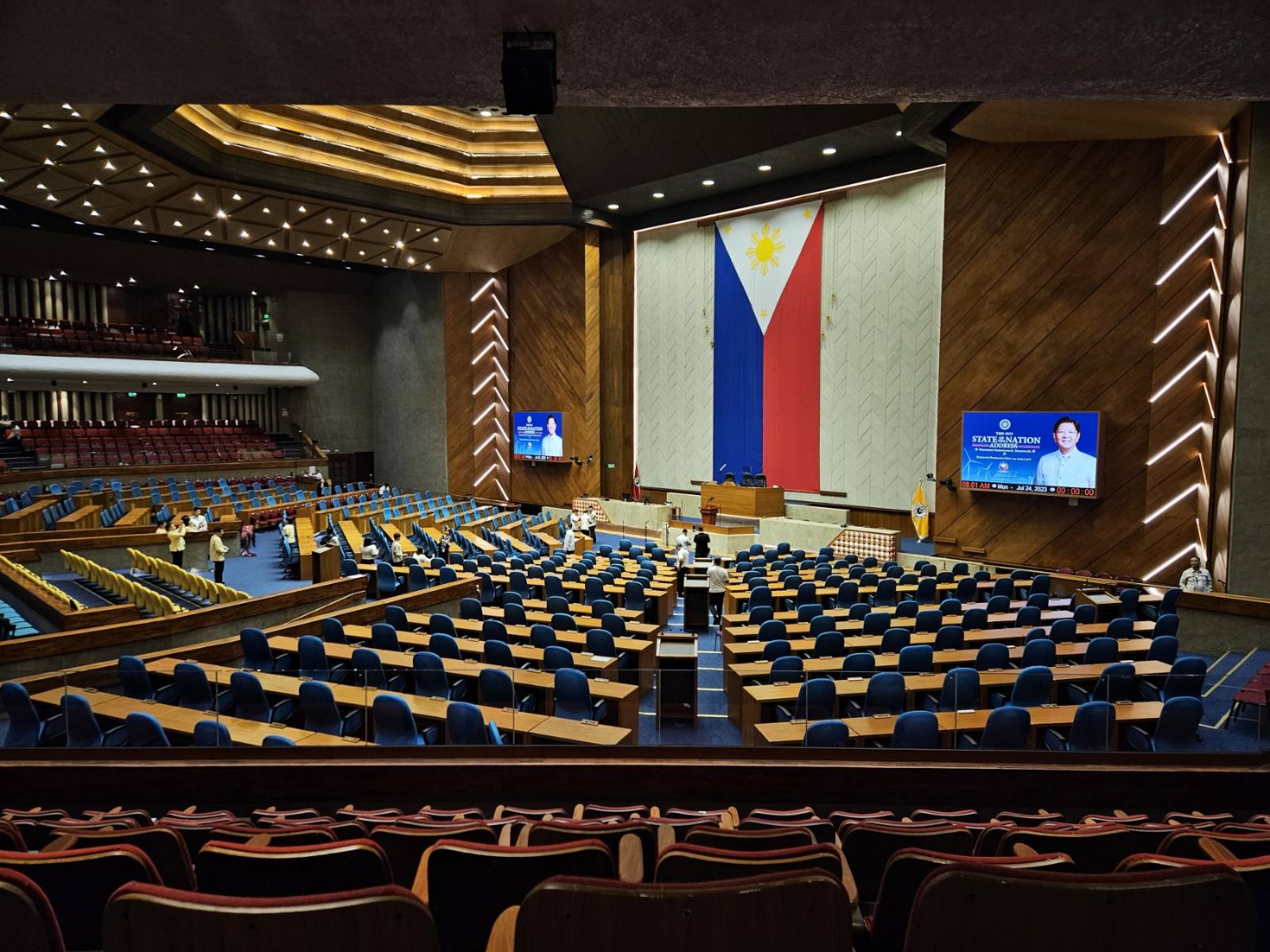Mission accomplished: MUP pension reform bill gets final House nod
At A Glance
- It took the House of Representatives just one month to approve the bill proposing a sustainable pension system for military and uniformed personnel (MUP), one of the more intensely urgent measures of the Marcos administration so far.
 The House plenary hall (Contributed photo)
The House plenary hall (Contributed photo)
It took the House of Representatives just one month to approve the bill proposing a sustainable pension system for military and uniformed personnel (MUP), one of the more intensely urgent measures of the Marcos administration so far.
Embodied in House Bill (HB) No.8969, the measure was overwhelmingly approved on third and final reading just before 1 a.m. Tuesday, Sept. 26 during a marathon session of the chamber.
The result of the nominal voting was 272-4-1 (yes-no-abstain), according to Deputy Speaker TUCP Party-list Rep. Raymond Democrito Mendoza. Mendoza presided over the tail end of the 16-hour plenary session, the majority of which was used for the debates on the P5.768-trillion General Appropriations Bill (GAB) for 2024.
Filed last Aug. 23--but with lots of discussions preceding it--HB No.8969 or the "Military and Uniformed Personnel Pension System Act" rationalizes the system of granting monthly pension and other benefits to personnel of the uniformed services in a way that is fair to them and the national government.
House Speaker Martin Romualdez, principal author, said the bill provides for a guaranteed three percent annual salary increase for MUP for the first 10 years from the time the proposed law takes effect.
"This landmark legislation demonstrates our unwavering commitment to the men and women in uniform, who risk their lives daily to maintain peace and order. It provides a robust, sustainable, and fair pension system that recognizes their invaluable service to our nation," Romualdez said in a statement following the bill's passage.
"With this reform, we're not only prioritizing the well-being of our MUP but also ensuring the country's economic stability. It is a testament to our commitment to national security and fiscal responsibility. I congratulate the ad hoc committee and my colleagues for their hard work and dedication towards this pressing issue," he added.
Committee on Ways and Means Chairman Albay 2nd district Rep. Joey Salceda headed the ad hoc panel for the MUP pension reform bill.
The proposed law covers “all employees of the government who wear uniforms, with ranks, may be armed or unarmed, primarily involved in national defense, enforcement of laws, and in the maintenance of peace, order, and security and who belong to any of the following services: Armed Forces of the Philippines, Philippine National Police, Philippine Coast Guard, Bureau of Fire Protection, Bureau of Jail Management and Penology, Bureau of Corrections, and commissioned officers of the hydrography branch of the National Mapping and Resource Information Authority who were transferred from the Bureau of Coast and Geodetic Survey".
Mandatory retirement age under the bill is 57 years, or upon accumulation of 30 years of active service, whichever comes later.
An MUP may voluntarily retire after 20 years of service. For key officers, retirement is upon completion of tour of duty or upon relief by the President.
The bill says that an MUP who is either killed or wounded in action resulting in total disability as certified by their respective services shall be considered compulsorily retired for purposes of computing their benefits.
HB No.8969 further provides that for those already in active service before the enactment of the measure, their monthly retirement pay shall be 50 percent of the base pay and longevity pay of the grade next higher to the salary grade they last held in case of 20 years of service, increasing by 2.5 percent for every year of service beyond 20 years to a maximum of 90 percent for 36 years of service and over.
The retiree may opt to receive in advance in one lump sum his retirement benefits for 36 months and get his monthly pension after three years, or receive his pension as it accrues after his retirement.
In the case of MUPs killed or wounded in action resulting in total permanent disability, retirement pay is computed at 90 percent of their base pay plus longevity pay, regardless of years of service.
For new entrants, or those who entered or re-entered the service after the enactment the proposed MUP pension law, retirement pay will be 50 percent of their base pay plus longevity pay in case of 20 years of service, increasing by 2.5 percent for every year of service beyond 20 years to a maximum of 90 percent for 36 years of service and over.
The pension of retired MUP and survivorship pension of qualified survivors shall be automatically indexed at a rate not exceeding 100 percent of the increase in the base pay of active MUP holding the same rank during the same year.
The proposed law also creates two MUP trust funds, one for the Armed Forces of the Philippines and another for uniformed personnel services, and a MUP trust fund committee chaired by the secretary of finance to administer the funds.
It designates the Government Service Insurance System (GSIS) as manager of the trust funds.
Financing sources for the trust funds shall include mandatory monthly contributions from new MUP entrants at the rate of nine percent of their salary, with the national government contributing 12 percent, augmentations from unprogrammed appropriations in the annual national budget, proceeds from lease, joint development and disposition of government properties, and government savings.
MUP trust funds will be exempt from all taxes, assessments, fees, charges, or duties of all kinds. The trust fund committee is mandated to provide assistance to indigent pensioners.